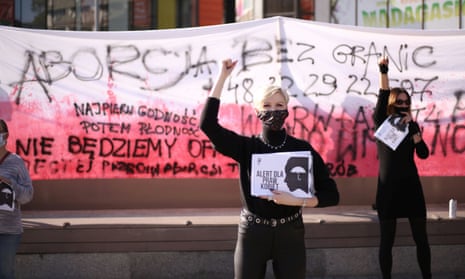Poland’s constitutional tribunal has ruled that abortion due to foetal defects is unconstitutional, rejecting the most common of the few legal grounds for pregnancy termination in the predominantly Catholic country.
The chief justice, Julia Przyłębska, said in a ruling that existing legislation – one of Europe’s most restrictive – that allows for the abortion of malformed foetuses was “incompatible” with the constitution.
After the ruling goes into effect, abortion will only be permissible in Poland in the case of rape, incest or a threat to the mother’s health and life, which make up only about 2% of legal terminations conducted in recent years.
The verdict drew immediate condemnation from the Council of Europe, whose commissioner for human rights, Dunja Mijatović, called it “a sad day for women’s rights”.
“Removing the basis for almost all legal abortions in Poland amounts to a ban and violates human rights,” Mijatović tweeted.
“Today’s ruling ... means underground/abroad abortions for those who can afford and even greater ordeal for all others.”
The court ruling could pave the way for lawmakers from the governing rightwing Law and Justice party (PiS) to approve draft legislation that would ban pregnancy terminations in the case of foetuses with congenital birth defects.
“The worst-case scenario that could have come true has come true. It is a devastating sentence that will destroy the lives of many women and many families,” said Kamila Ferenc, a lawyer who works with an NGO helping women denied abortion.
Many Polish women bridled at PiS backing the bill that had originated as a popular petition earlier this year, eventually prompting conservative lawmakers to refer the matter to the constitutional court.
The tribunal, whose main role is to ensure that any law complies with the constitution, underwent government changes in 2016 that led critics to contend it is stacked with PiS allies.
The former liberal Polish premier and PiS critic Donald Tusk called the timing of the abortion issue “political wickedness”.
“Throwing the topic of abortion and a ruling by a pseudo-court into the middle of a raging pandemic is more than cynical,” said Tusk, the head of the European People’s party.
The PiS-allied president, Andrzej Duda, has said that if approved by the parliament he would sign the draft legislation into law.
The country of 38 million people has fewer than 2,000 legal abortions a year, but women’s groups estimate that up to 200,000 procedures are performed illegally or abroad.
An attempt by the PiS government to tighten the abortion law in 2016 was scrapped after nationwide protests by tens of thousands of women dressed in black.
